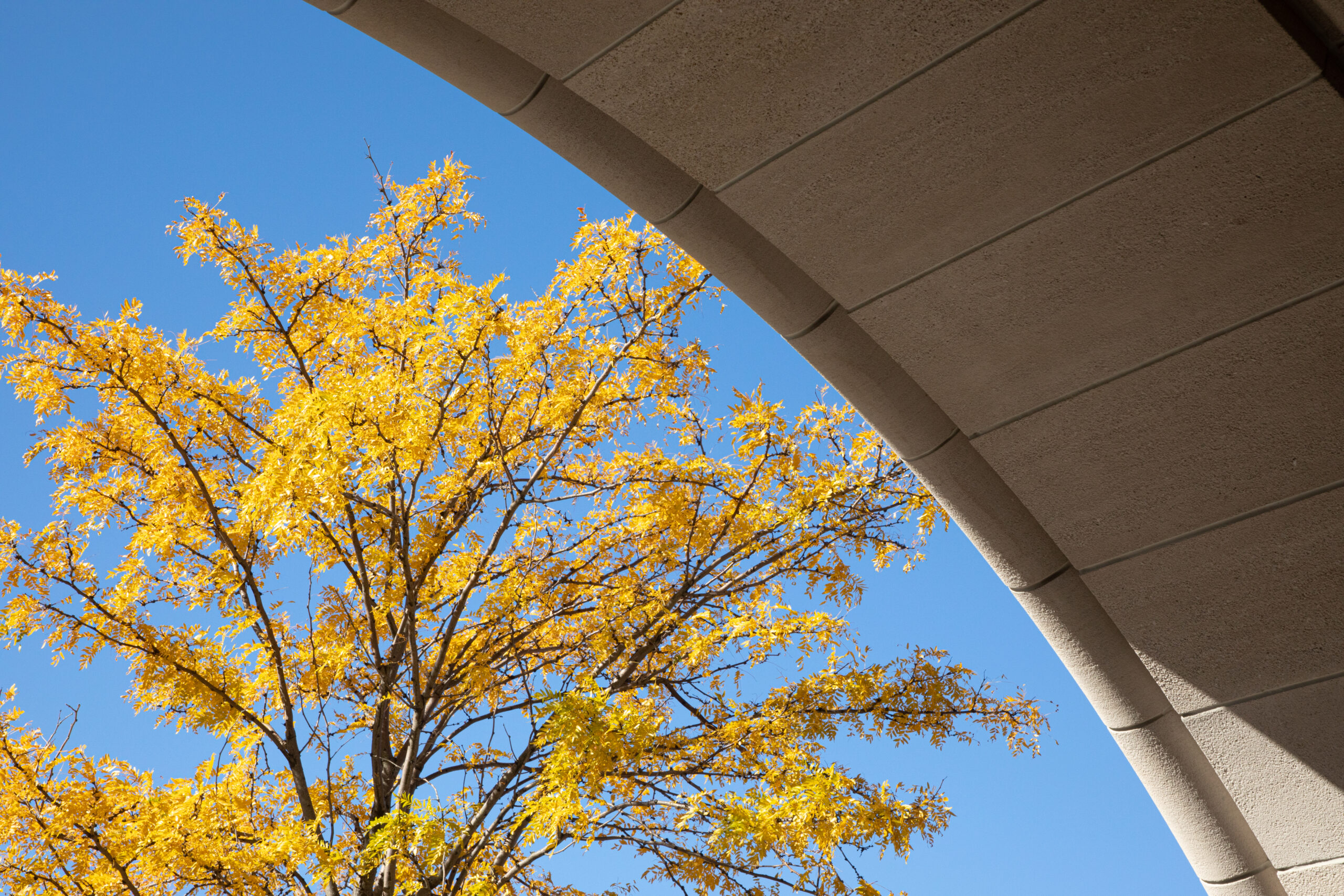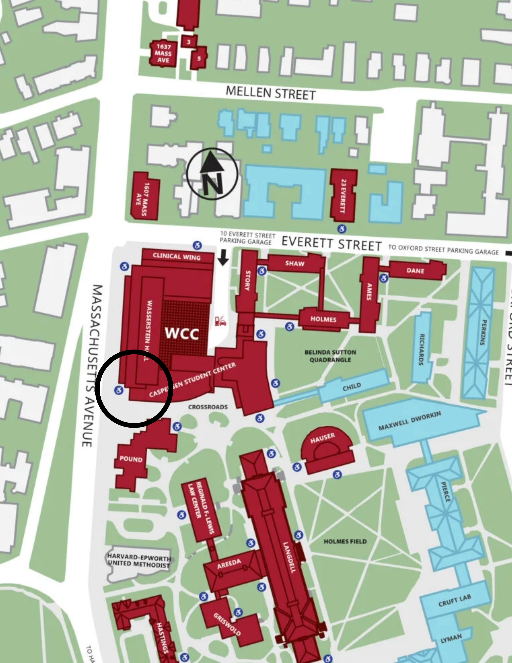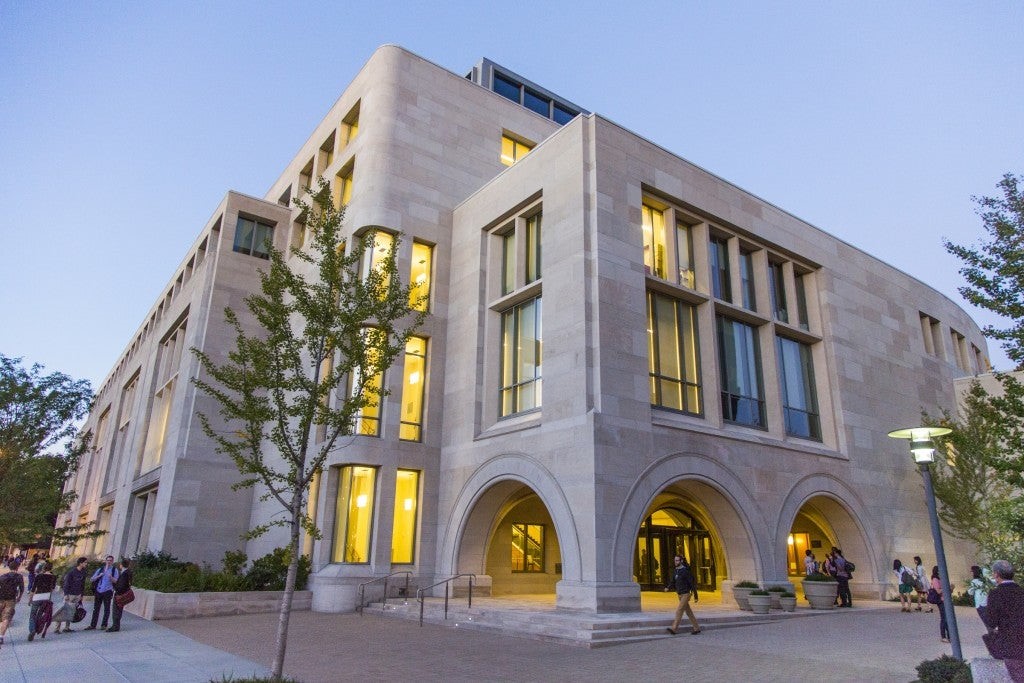
2024 International Human Rights Clinicians’ Conference
Logistical Information
Harvard Law School, Wasserstein Hall, 1581 Massachusetts Ave, Cambridge, MA 02138. All conference sessions will take place in this building.
As access to Harvard Law School buildings is restricted, staff will be waiting to meet you at the entrance to Wasserstein Hall, 1581 Massachusetts Ave, and will escort you to the conference room. The entrance is circled on the map and pictured below. Visit this page to view a map of campus and directions on how to reach Harvard Law School.
Note: If you are arriving or leaving by taxi or rideshare, use 1557 Massachusetts Avenue (Lewis Circle) as your pickup/drop off location. From this location, it is a short walk to the Wasserstein building (see map). 

If you are having challenges finding Wasserstein Hall once you arrive on campus, please call one of the following members of the Clinic team:
Kelsey Ryan: +1-508-333-0268
Sanjana Nayak: + 1-609-865-3237
All conference sessions will take place on the second floor of the Wasserstein Building. Our Clinic offices are on the third floor and are available for participants to use for private workspace if needed.
Campus Wi-Fi: Click this link for instructions on getting connected to Harvard’s WiFi.
A coat and luggage storage area will be available throughout the conference.
Please dress for your comfort and note that Saturday’s dinner is located a 10–15-minute walk from campus.
On-campus parking will be available for Saturday (parking is free in Cambridge on Sundays) but must be arranged in advance. Please contact Sanjana Nayak ([email protected]) if you require parking.
A pumping/nursing room will be available. Please contact Sanjana Nayak ([email protected]) to arrange access.
Conference Agenda
6:30-9:30pm – Optional informal evening reception Cambridge Common Restaurant, 1667 Massachusetts Ave, Cambridge.
8:45-9:15am – Breakfast
9:15-10:00am – Introductions & Welcome
Welcome remarks from Chris Bavitz, HLS Vice Dean for Experiential and Clinical Education & Managing Director of the Cyberlaw Clinic, followed by an introductory exercise.
10:00-10:45am – Town Hall: Community Reflections on Campus Climate
All clinicians are invited to share reflections on the 2023-24 academic year. What has the campus climate looked like for you? How have you experienced the year? How has campus climate and Israel-Gaza affected your work, student advising, and personal wellbeing? What roles have international human rights clinicians played in navigating tensions among students, colleagues, or other parts of the university?
Moderated by International Human Rights Clinic Director Susan Farbstein.
10:45-11:00am – Coffee Break
11:00am-11:45am – Panel: Teaching Hope and Resilience in Human Rights Clinics
Panelists will discuss how we teach about hope and resilience in human rights clinics. The session will explore modalities for teaching resilience in human rights clinical seminars and projects. Panelists will reflect on practices that could balance the needs of students with the needs of clinical faculty and staff. The session will also explore whether there are lessons from the larger human rights movement that we can apply internally to foster hope, resilience, and resistance to despair.
Moderated by Monica Iyer
Panelists: Kathryn Sikkink, Lindsay M. Harris, and Anjli Parrin
11:45am-12:30pm – Breakout Groups: Discussion on Town Hall & Hope and Resilience Panel Topics
Facilitators: Petra Molnar, Sarah Dávila, Jocelyn Getgen Kestenbaum, Ramya Jawahar Kudekallu, Sarah Paoletti, Aya Fujimura-Fanselow
12:30-1:30pm – Lunch
1:30-2:35pm – Peer Learning Rounds: Explorations of Clinical Work
Presenters will share examples of skill-building/experiential exercises or advocacy/impact from their clinics. Conference attendees will rotate among presentations based on which topics they are interested in. There will be three rotations.
1. Teaching Effective Non-Adversarial Advocacy When Your Collaborator’s Personal Safety Depends on it – Juliet Sorensen
2. Explorations of Clinical Work through Simulation Design – Ramya Jawahar Kudekallu
3. Cross-Clinic Collaboration on Advocacy Before the United Nations Human Rights Committee Review of the U.S.A. – Sarah Dávila, Lauren Bartlett, and Tamar Ezer
4. Shaping Student Leadership in the Classroom Space – Sienna Merope-Synge
5. Helping Students Engage with Alternative Viewpoints Through an Active Listening Exercise – Stephan Sonnenburg
6. Using Participatory Methodologies for Transnational Movement Lawyering: Case Studies from Honduras – Kelsey Jost-Creegan
7. Teaching Media Advocacy Through Classroom Simulation – Beatrice Lindstrom and Paras Shah
2:35-2:50pm – Coffee Break
2:50-4:05pm – Panel: Clients, Partnerships & Collaboration
International human rights clinics vary in their approaches to collaboration, including the types of entities with whom they work and the structures of those collaborations. This panel will feature clinics working with individual clients, coalitions, organizational partners (grassroots and large organizations), and communities/social movements to explore some of the opportunities and challenges that these collaborations present for student experience, partner experience and expectations, impact, long-term cooperation, and the incorporation of anti-racist approaches.
Moderated by Gulika Reddy
Panelists: Anna Crowe, Sienna Merope-Synge, and Citlalli Ochoa
4:05-4:55pm – Breakout Groups: Professional Development
1. New Clinicians (three years or less)
Facilitated by Daniel Levine-Spound and Sarah Dorman
3. Mid-Career clinicians
Facilitated by Beatrice Lindstrom and Aya Fujimura-Fanselow
Clinic Leadership
4. Group1 facilitated by Lauren Bartlett and Francisco Rivera (last names ending A-K)
6. Group 2 facilitated by Susan Farbstein and Jocelyn Getgen Kestenbaum (last names ending L-Z)
5:00-6:20pm – Optional on-campus informal reception in HLS International Human Rights Clinic’s suite
6:30pm – Conference dinner: Russell House Tavern, 14 John F. Kennedy Street, Cambridge, MA 02138.
8:45-9:15am – Breakfast
9:15-11:00am – Breakout Groups: Common Challenges in Human Rights Clinical Teaching and Supervision
1. Teaching Writing – Facilitated by Tamar Ezer
2. Balancing Student Leadership, Ethics, and Partner-Led Lawyering – Facilitated by Kelsey Jost-Creegan and Priyanka Motaparthy
3. Incorporating Anti-Racist Practices (Group A) – Facilitated by Anita Sinha
4. Incorporation Anti-Racist Practices (Group B) – Facilitated by Ramya Jawahar Kudekallu
5. Providing Mentoring and Career Advising to Students – Facilitated by Aminta Ossom
11:00-11:15am – Coffee Break
11:15am-12:15pm – Breakout Groups: Substantive Areas of Work
1. Climate Change and the Environment – Facilitated by Monica Iyer
2. Israel/Palestine – Facilitated by James Yap and Susan Akram
3. Human Rights in the United States – Facilitated by Sarah Paoletti
4. Inter-American System Engagement and Advocacy – Facilitated by Francisco Rivera and Angel Gabriel Cabrera Silva
5. Engaging with UN Treaty Bodies / Special Procedures – Facilitated by Bridget Arimond
6. Solidarity with Human Rights Defenders – Facilitated by Thomas Antkowiak and Tejal Jesrani
7. Technology and Human Rights – Facilitated by Petra Molnar and Stephan Sonnenberg
12:15-1:00pm – Plenary: Wrap Up
1:00pm – Lunch
After lunch social option:
Visit Harvard Art Museums